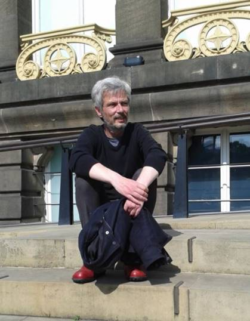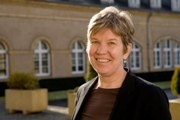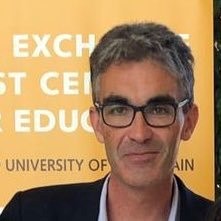Keynote speakers
Monday 29th March, 9.45-10.35am - Dr Alex Ding
UNIVERSITY OF LEEDS
Dr. Alex Ding is Director of Scholarship in the School of Languages, Cultures and Societies and Associate Professor of English for Academic Purposes at the University of Leeds. He has published on practitioner agency and identity and he is the co-author, with Ian Bruce, of ‘The English for Academic Purposes Practitioner: Operating on the Edge of Academia’. He is also co-editor of a book series ‘New Perspectives on English for Academic Purposes’ (Bloomsbury) and is currently writing on Bourdieu and co-editing a volume entitled ‘Social Theory for English for Academic Purposes: Foundations and Perspectives’.

‘A pessimist because of intelligence, but an optimist because of will’*: A manifesto for collective language education scholarship.
Recent events, such as Covid and Brexit, combined with deeper and longer-standing structural and ideological shifts in higher education have magnified the existential threat to the future of teaching and learning of languages in universities. Combined with persistent and opportunistic neoliberal policy discourse, around, for example, the apparent affordances of digital education, practitioners of language education would be – understandably – excused for being pessimistic. Alongside this discourse are strong imperatives to, for example, decolonise practices, strive for greater inclusivity, and co-construct the curriculum.
Beginning with a brief taxonomy of the existential threats to language education in HE (many familiar but some less so) I make a case for principled pessimism. However, this needs to be combined with ‘an optimism of will’: through scholarship which is ‘collegial, collaborative and conversational, but also critical, combative and cautious’ with the belief that ‘scholarship has the potential to enable language educators to actively shape their educational contexts rather than be shaped by circumstance, others and powerful ideologies and structures’**. This suggests an enlarged, potent, public, and political form of scholarship that harnesses our collective, cross-language and cross-institutional talents, interests, and concerns to enact change for the benefit of practitioners and students.
The final part of this talk explores ways in which we might achieve greater collective agency through striving for greater (symbolic, social, and epistemic) capital by adopting a reflexive and objective socio-analysis of the field(s) in which we operate: to reposition language(s) as visible and central to a progressive vision of Higher Education.
* Gramsci
** https://languagescholar.leeds.ac.uk/manifesto-for-the-scholarship-of-language-teaching-and-learning/
Tuesday 30th March, 9.45-10.35am – Prof. Adelheid Hu
UNIVERSITY OF LUXEMBOURG
Adelheid Hu is Professor of Multilingual Education and Applied Linguistics at the University of Luxembourg. Her main research interests include plurilingual education; intercultural studies (Europe-China); language policy in HE; language, identity and globalization. Before working in Luxembourg (since 2011), she has been Professor for Foreign Language Pedagogy at the University of Hamburg (2001-2011). Her working experience also include a lecturer position at Tunghai Unversity, Taiwan and a visiting appointment at the University of Franche-Comté in Besançon, France. Her last publications include a Special Issue in the European Journal for Applied Linguistics (EuJAL) on “Capitalizing on Linguistic Diversity in Education”: https://www.degruyter.com/view/journals/eujal/8/2/eujal.8.issue-2.xml

Navigating between Plurilingualism and (new) Monolingualism:
University Students’ Perspectives on the Use of their Plurilingual Repertoires for Learning and Academic Writing.
In recent years, the view on the relationship between knowledge and language has received renewed attention with respect to the globalization of science and Higher Education. Many linguists and educationalists emphasize that language is not simply an accumulation of word tags that were attached to language-independent elements of knowledge. Rather, the organization, storage, and transfer of knowledge itself already happens in linguistic form, so that language takes on a strong knowledge-constituting function. Thus – to give but one example – central concepts of the Humanities like education/éducation/Bildung, culture/Kultur, civilization or 文化 (wén huà) have different connotations in German, French, English or Chinese, since they developed in different historical-cultural and conceptual contexts. Precisely in these interconnections between multilingualism and the constitution of knowledge seems to lie an enormous potential, not only to facilitate a differentiated understanding of scientific questions but also what are today key competences and attitudes: the ability to communicate and act across borders, respect for different worldviews, the relativizing and decentering of the self.
On the contrary, in the current (and powerful) discourse on the globalization and internationalization of science internationality and multilingualism are only related to each other superficially, for instance in terms of the existence or absence of English-language programs. The diversity of students’ linguistic identities and their role in communication and educational processes are rarely addressed. The fact that many students and researchers write in their second or third language is mostly seen under the perspective of their language competence/near-nativeness in the “target language”, and much less of their plurilingualism as a resource for learning and research.
I this talk I will briefly present 3 projects which give voice to post-graduate students and doctoral candidates regarding the use of their plurilingual repertoires. The first study investigates seminar notes of multilingual students in a MA-programme at the trilingual and international University of Luxembourg; the second study (within a larger European Jean-Monnet project) sheds light on the perspectives of doctoral candidates and their supervisors in several countries, again regarding the potential of plurilingualism for their research. The third study also focusses on doctoral researchers but stresses the language ideologies and macro-discourses which impact on language choice and writing practices of early career researchers. The studies show that all the students/doctoral researchers have a rich plurilingual repertoire. At the same time, they navigate between different influential macro-discourses which sometimes foster, but also hinder the use of their full linguistic resources.
Wednesday 31st March, 9.45-10.35am - Dr Robert O’Dowd
UNIVERSITY OF LEÓN, SPAIN
Dr. Robert O'Dowd is Associate Professor (professor titular) for English as a Foreign Language and Applied Linguistics at the University of León, Spain. He has taught at universities in Ireland, Germany and Spain and has over 40 publications on the application of Virtual Exchange in university and pre-university education settings. He was the founding president of the UNICollaboration academic organization for telecollaboration and virtual exchange (www.unicollaboration.org) and has been invited to be plenary speaker at international conferences in the US, Asia and across Europe.
Among recent activities, he was invited in 2019 to be co-editor of a special edition of the prestigious journal Language Learning & Technology on the theme of Virtual Exchange in Foreign Language Education. He also coordinated the Erasmus projects Integrating International Networks in Higher Education (INTENT) (2011-2014) and the European Policy Experiment Evaluating and Upscaling Telecollaborative Teacher Education (EVALUATE) (2017-2019).
He is currently coordinating the Erasmus+ European Policy Experiment Virtual Innovation and Support Networks for Teachers (VALIANT) (2021-2024) and collaborates with other experts in the UNICollaboration organisation to offer comprehensive evaluation studies of Virtual Exchange programmes. Robert’s publications are available here: http://unileon.academia.edu/RobertODowd and you can follow him on twitter @robodowd.

The impact of Virtual Exchange in University Foreign Language Education: What we know so far
In universities around the globe, an increasing number of foreign language educators are engaging their students in intercultural collaborative projects with partners from other countries using digital technologies. This is commonly known as Virtual Exchange (VE) or Collaborative Online International Learning (COIL) or telecollaboration.
This activity has been supported by organisations such as UNICollaboration (https://www.unicollaboration.org/ ) which was launched in 2016 to support the research and practice of Virtual Exchange in university education. In the United States the Stevens Initiative (https://www.stevensinitiative.org/ ) was established to promote Virtual Exchange between young people in the US and the Middle East and North Africa. The European Commission has also promoted Virtual Exchange by establishing the Erasmus+ Virtual Exchange platform (https://europa.eu/ youth/erasmusvirtual) and also plans to integrate Virtual Exchange into blended mobility initiatives in its new programme in 2021.
But what do we know about the impact of Virtual Exchange? The past three years have also seen the publication of a plethora of impact reports and studies which present the findings or projects, initiatives and organisations who are engaged in promoting large-scale Virtual Exchange initiatives. For the most part, these publications present both qualitative and quantitative data on what students learn from Virtual Exchange and what teachers and institutions can do to support this learning. In this presentation I will use these publications to try and answer three questions: What do students learning from Virtual Exchange? How can we support teachers who want to become involved in the activity? And what can we identify as examples of good practice for implementing Virtual Exchange in university classrooms.
